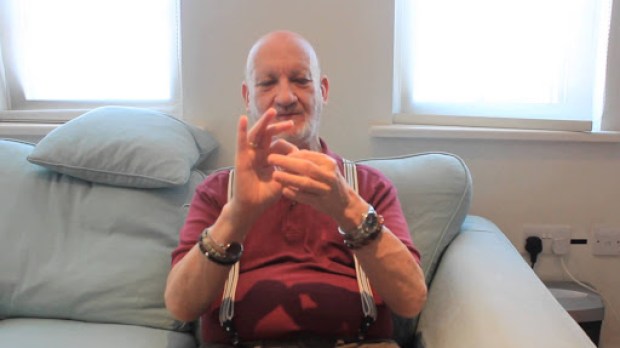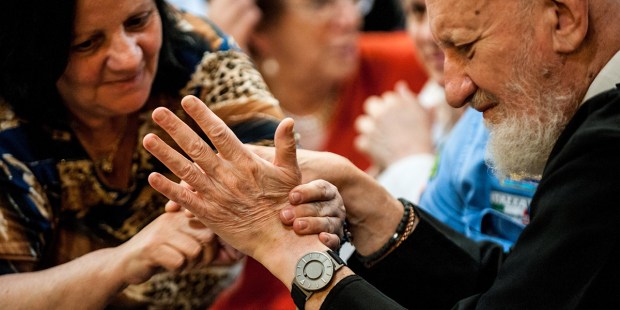Fr. Cyril Axelrod is a retired priest who is deaf and blind and still spreads the Word of God, especially through the internet. He’s 80 years old and belongs to the Redemptorist order. He lives in London, where he carries out his pastoral ministry among people who, like him, cannot hear or see.

Disability as a way of life
"Most people’s view of deaf-blindness is that it is unspeakable, unthinkable, and unimaginable,” Fr. Cyril explains. “For me it has become a new way of life that has offered a new direction. There are certainly frustrations to overcome, but you also experience many joys and new challenges. In a way, my deaf and blind condition has become the most important teacher in my life."
Fr. Axelrod wasn’t always blind. He was born deaf and was found to suffer from Usher’s Syndrome, which is what caused him to gradually lose his sight in adulthood.
"Angels sent from God"
Fr. Cyril speaks of his deafness and blindness as “gifts from God,” and he does so to convey a message of courage, patience, and perseverance and to help us overcome the challenges that everyday life places before us. The deaf-blind priest says that disabled people, especially children, are "angels sent by God" to teach the able-bodied "lessons of unconditional love, trust, hope, faith, and inner peace." In a 2012 interview with Mark Reidy of The Record, a news outlet of the Archdiocese of Perth, Australia, he says:

His interest in helping hearing impaired children found a particularly courageous expression during apartheid in his native South Africa. The Record reports that Fr. Axelrod advocated for the rights of Black children who are deaf during that time of terrible racism and segregation. Later, he would also work to help children in China with deafness and blindness who were considered “a burden and a source of shame for the family” and who were therefore ostracized and hidden away.
Perhaps the fact that Fr. Axelrod was born into a poor Jewish family helped him be more keenly aware of the evils of prejudice and violence against those who are considered different.
Reporter Mark Reidy explains that before he became Catholic, 15-year-old Cyril Axelrod tried to become a rabbi, but was rejected because of his deafness. He went to Catholic schools and eventually felt called to become a Catholic himself, and a priest.
Meeting with Paul VI
In the course of his life, the Redemptorist priest has reportedly met three popes, to whom he has communicated his "style" and his "conception" of disability. The first time was in 1971, a few months after his ordination, when his disease had not yet affected his sight, explains an article in La Stampa. In his autobiography And the Journey Begins, Fr. Axelrod recalls that meeting with Paul VI, saying that when Pope Paul VI heard his name, he smiled and his face lit up.
The pope's tears
The pope told him that he had been informed about his ordination by his bishop, and that Fr. Axelrod was the first deaf priest he had met. The pope embraced him and mentioned what a great gift the priest’s mother had given the Church. (She had initially rejected Fr. Axelrod’s conversion, but eventually came around and was present at his ordination.) The pope then blessed him, saying, "Go and preach God's love to the deaf." Father Axelrod was deeply moved by this encounter with the pope, which he saw as “a sign of the wonders God had in store for him,” La Stampa reports.
More recently, Fr. Axelrod met Pope Francis in 2014 during a papal audience with the Apostolic Movement for the Blind and the Little Mission for the Deaf. He spoke with the pontiff about disabilities as a gift of God to the world, and the two embraced; in an unusual reversal, Fr. Axelrod gave the pope his blessing. The Southern Cross, a South African publication, reports that the priest repeated the gesture when he met Pope Francis a second time, in 2016 during the Year of Mercy.
Slowing down
The pandemic combined with Fr. Axelrod’s age has put an end to his former travels to minister to the needs of the deaf and blind around the world. He told The Southern Cross:
The art he refers to are his paintings, made using strings to help him form the outlines of the figures he depicts. Some of his paintings have been collected and printed in a book, Light in Silent Darkness.



